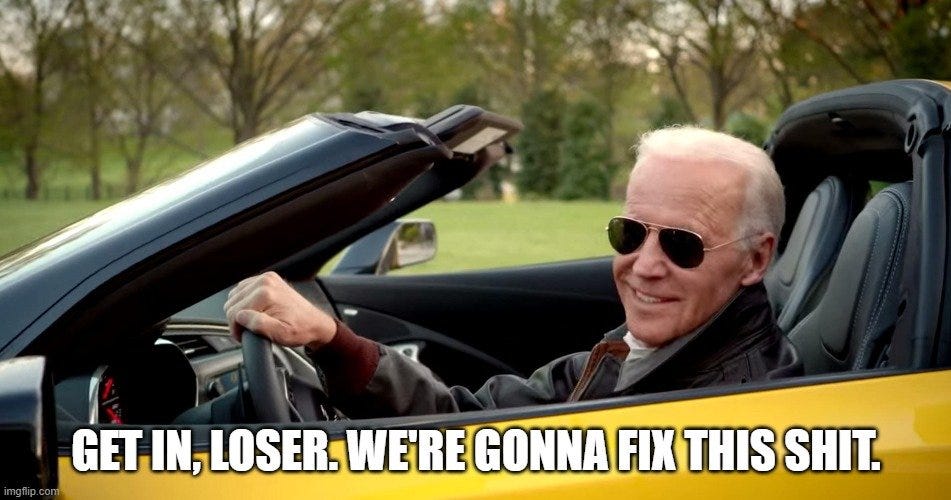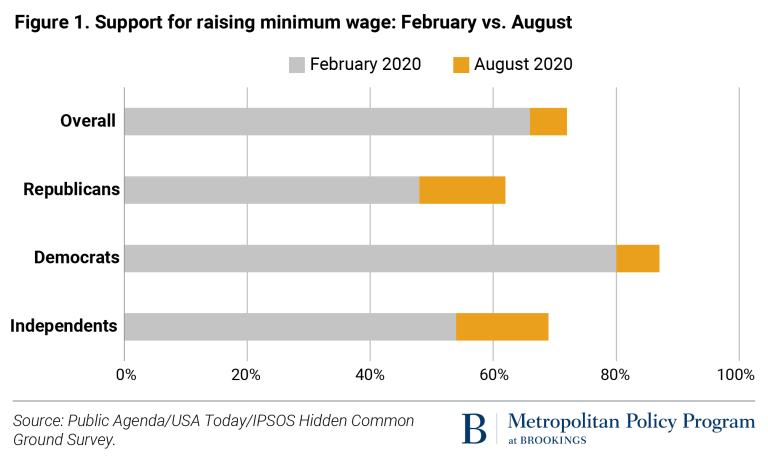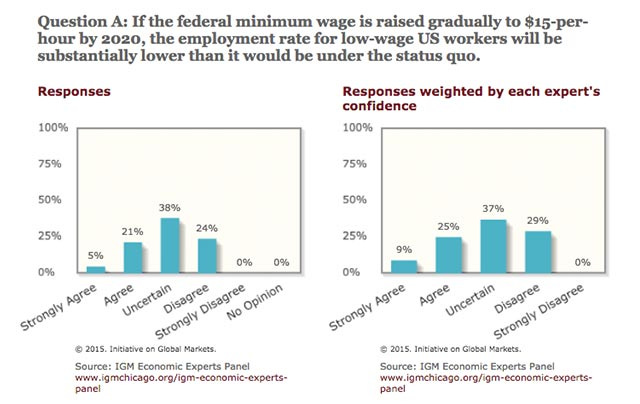Minimum wage cabals, China showdown, vaccine optimism, and more
Plus: Bloomberg roundup
I’m enjoying these weekly short-thoughts posts. They make my newsletter feel like a real newsletter, and there’s lots of stuff that I don’t have enough thoughts (or time) to write a full post about.
But let me know what you think. Are these roundups enjoyable? Informative? Boring? Feel free to let me know in the comments. Also, these roundups should be a place where you can sound off or ask me about anything that’s on your mind, or suggest more stuff you’d like me to write about.
Anyway…
The minimum wage cabal
My colleague Tyler Cowen writes of the public debate over the minimum wage:
No matter what you think about the recent literature on the minimum wage, all economic theories imply that minimum wages should be decided at the state and local level, given the economic heterogeneity of the United States. That is the message that you as an economist should be carrying forward.
Do you think Puerto Rico should be a state? Should they have a $15 minimum wage too? Come on. Yes, it is easy enough to make an exception for them, and by the way the median manufacturing wage in Mississippi is below $15 as well. Rinse and repeat.
I am sorry to speak in such terms, but the reality is that an allied cabal of activists and left-wing economists have combined on social media to insist on a particular approach to minimum wage economics and to bully those who disagree.
First of all, let me say that it’s pretty cool that the economics profession has come to a point where people can say the phrase “left-wing economists” without thinking twice. It really speaks to the ideological balancing that has happened within the profession.
Also, the Twitter bullying of Jennifer Doleac for being against the minimum wage is truly uncalled-for. You can think she’s not heeding the empirical evidence, and you can even suspect her of being callous toward the plight of low-wage workers, but demonizing her and digging up and bashing her old papers on Twitter doesn’t help advance the cause of minimum wage or of poverty alleviation in general. It’s just jerky. Plenty of economists are still skeptical of the federal $15 minimum wage, and it’s their right to be skeptical. There is some point where minimum wage gets too high (imagine a $5000/hr. minimum wage), and it’s anyone’s right to argue that $15 is past the safe level. If their arguments are bad, we should beat them with evidence and reason, not with Twitter dunking.
OK that said: Cabal? No. Lots of people support a $15 federal minimum wage. In 2019, 43% of Republicans supported it:
In general, support for minimum wage hikes has grown substantially during the pandemic:
When you have an idea with support this broad, you definitely do not need a cabal of activists. Nor would you need a fringe of left-wing economists:
Opinion is fairly evenly split here.
Now that doesn’t mean a federal $15 minimum wage is the right policy, and it doesn’t mean Tyler’s objections are wrong. In fact, I’ll address substantive arguments against the $15 minimum wage in a later post. But for now, I just want to point that there no cabal here — most Americans are fans of the minimum wage, and when people are fans of something, they tend to stump for it on Twitter. It’s the inherent toxicity of Twitter, not the intentional efforts of a cabal, that results in the unnecessary bullying of people with minority opinions.
The China showdown
A number of people thought that Joe Biden would be dovish on China. The least ridiculous reasons for thinking this were: A) He was dovish on China for a long time, and B) Trump was hawkish on China, and it made sense that Biden would do the opposite of whatever Trump did. But we’re rapidly discovering that Biden is, in fact, quite a China hawk. Here are some stories from the past week:
1) Antony Blinken, Biden’s nominee for Secretary of State, said he agreed with outgoing Secretary of State Mike Pompeo that China’s actions in Xinjiang constitute a “genocide” against the Uighur Muslim minority. He suggested sanctions and export restrictions as a way to put pressure on China to stop. A National Security Council spokesperson stated that Biden agreed with Blinken that the repression of the Uighurs constitutes genocide.
2) Blinken also called for a closer partnership between the U.S. and Taiwan, vowing to help Taiwan improve its ability to defend itself. He warned China that an invasion of Taiwan would be a “grievous mistake”, and said Taiwan should play a larger international role around the world. Blinken also supported closer contacts between the U.S. and Taiwan. In a January 23rd statement, the State Department said:
The United States notes with concern the pattern of ongoing PRC attempts to intimidate its neighbors, including Taiwan. We urge Beijing to cease its military, diplomatic, and economic pressure against Taiwan and instead engage in meaningful dialogue with Taiwan’s democratically elected representatives.
We will stand with friends and allies to advance our shared prosperity, security, and values in the Indo-Pacific region — and that includes deepening our ties with democratic Taiwan. The United States will continue to support a peaceful resolution of cross-strait issues, consistent with the wishes and best interests of the people on Taiwan. The United States maintains its longstanding commitments as outlined in the Three Communiqués, the Taiwan Relations Act, and the Six Assurances. We will continue to assist Taiwan in maintaining a sufficient self-defense capability. Our commitment to Taiwan is rock-solid and contributes to the maintenance of peace and stability across the Taiwan Strait and within the region.
3) Janet Yellen, Biden’s pick for Treasury Secretary, pledged that the U.S. will take on China’s “abusive, unfair, and illegal trade practices”. She specifically singled out government subsidies, dumping, and trade barriers. Analysts generally believe that Biden will maintain Trump’s tough trade stance toward China.
4) A U.S. carrier group entered the South China Sea, immediately after China mounted a large aerial incursion of Taiwan’s air defense zone.
5) In a phone call, new National Security Adviser Jake Sullivan reassured his Japanese counterpart that the U.S.-Japan defense treaty applies to the Senkaku Islands, which Japan holds but China claims, and which are the locus of increasing military tensions between the two countries. In other words, if China tries to take the islands, the U.S. will step in to defend them.
So on Xinjiang, Taiwan, trade, and regional military tensions, Biden looks set to be as hawkish as his predecessor — but in a much more deliberate, methodical way.
This is going to require some mental adjustment for Democrats. Of course, they’re obviously free to criticize and disagree with Biden’s policies. But the notion that U.S.-China conflict was a phantasm cooked up by Donald Trump, rather than a real long-term clash of interests, must go by the wayside. The tacit belief that criticism of China is inherently racist — born of the COVID-19 pandemic, when some people took out their fear of the virus on Asian people — must also be excised.
Sometimes countries simply have conflicts, and this is one of those times.
Vaccine optimism
I’ve been pretty down on the U.S.’ vaccine rollout efforts, and there are still pockets of extreme incompetence (cough, California, cough). But things appear to be on the upswing. The U.S. is now putting about 1.2 million shots into arms per day, and the rate is accelerating. We’re even vaccinating on weekends now!
Of course, it’s too early to say that this is Biden’s doing, but in a tiny sign of increased urgency, I noticed that the CDC started updating their vaccination data on weekends, instead of just Monday/Wednesday/Friday as before. Institutional repair starts with the little things — with pride, a sense of mission, urgency, and high expectations.
Meanwhile, Fauci says that the Johnson & Johnson vaccine could get approved in two weeks, which would be a huge boost to vaccination efforts. The J&J vaccine requires only one shot, can be stored at room temperature, and uses a different supply chain than the Moderna and Pfizer mRNA vaccines, so can be produced in parallel. We also have some of it produced already. If J&J comes through as expected, vaccination efforts will speed up even more and be more sustainable throughout the next three months. At that point, it would probably make sense for Biden to up his 100-day vaccination target from 1 million shots per day to 2 million per day.
And in another bit of good news, COVID cases are plummeting. Apparently people are staying home and refusing to take risks while they wait for the vaccine.
Good! Stay inside! Help is on the way! Just a little while longer!
Anyway, now for this week’s Bloomberg Opinion articles:
Minimum wage safeguards
As I argued before, the $15 federal minimum wage isn’t nearly as dangerous as skeptics believe. But that doesn’t mean it’s perfectly safe. In a column this week, I explain ways to make the minimum wage really really super extra-safe:
But even if the danger of a $15 minimum wage is much less than economists used to think, that doesn’t mean it’s zero. There are three big dangers. Fortunately, there’s a fix for each of these…[G]ive low-wage areas a partial exemption from the federal minimum wage…allow the government to lower the minimum wage temporarily in case of a severe recession…[and] allow small businesses to have slightly lower minimum wages.
Keep in mind, these are just ways to make the policy iron-clad. We may want to implement these safeguards, or we may decide they don’t pass a cost-benefit test. The point is that it’s easy to tweak the $15 policy to eliminate basically all risk, if we’re scared.
Anyway you can read the whole thing here!
Let’s let Europe (mostly) sit this China trade war out
Europe wants money, and they’re going to go after it. The U.S. is upset about the EU-China investment deal, but we shouldn’t be. Instead of trying to press-gang Europe into a broad anti-China coalition, we should focus on narrow areas in which we need to make Europe cooperate with us for national security reasons, like Huawei:
But it was always probably too much to expect Europe to form a united front with the U.S. to tackle China. The simplest way of comprehending this is to just look at a map -- unlike India or Japan or Vietnam, Europe is under no territorial threat from China…
The EU is also very wary of getting caught in the middle of a protracted U.S.-China economic struggle…
One obvious measure is for the Biden administration to focus on steps that the U.S. can take without European help. For example, restrictions on Chinese investment in the U.S. don’t require EU cooperation…
The U.S. should abandon its efforts to extend its export-control regime to allied and third-party countries…
But there are a few cases in which neutrality can’t be an option. Huawei is probably one of these[.]
You can read the whole thing here!









I find the roundups informative. If you can't find fun memes to throw in, add bunnies.
I enjoy the short posts greatly: but there's no reason IMHO to combine several into one bigger post in this blog. Why not simply post them separately?
As for Tyler Cowan, a wholly owned subsidiary of Koch Industries, the best response is Adam Smith:
"People of the same trade seldom meet together, even for merriment and diversion, but the conversation ends in a conspiracy against the public, or in some contrivance to raise prices."
"We rarely hear, it has been said, of the combinations of masters, though frequently of those of workmen. But whoever imagines, upon this account, that masters rarely combine, is as ignorant of the world as of the subject. Masters are always and everywhere in a sort of tacit, but constant and uniform combination, not to raise the wages of labour above their actual rate. To violate this combination is everywhere a most unpopular action, and a sort of reproach to a master among his neighbours and equals. We seldom, indeed, hear of this combination, because it is the usual, and one may say, the natural state of things, which nobody ever hears of." --Bk 1, Ch 8, WoN (Adam Smith)